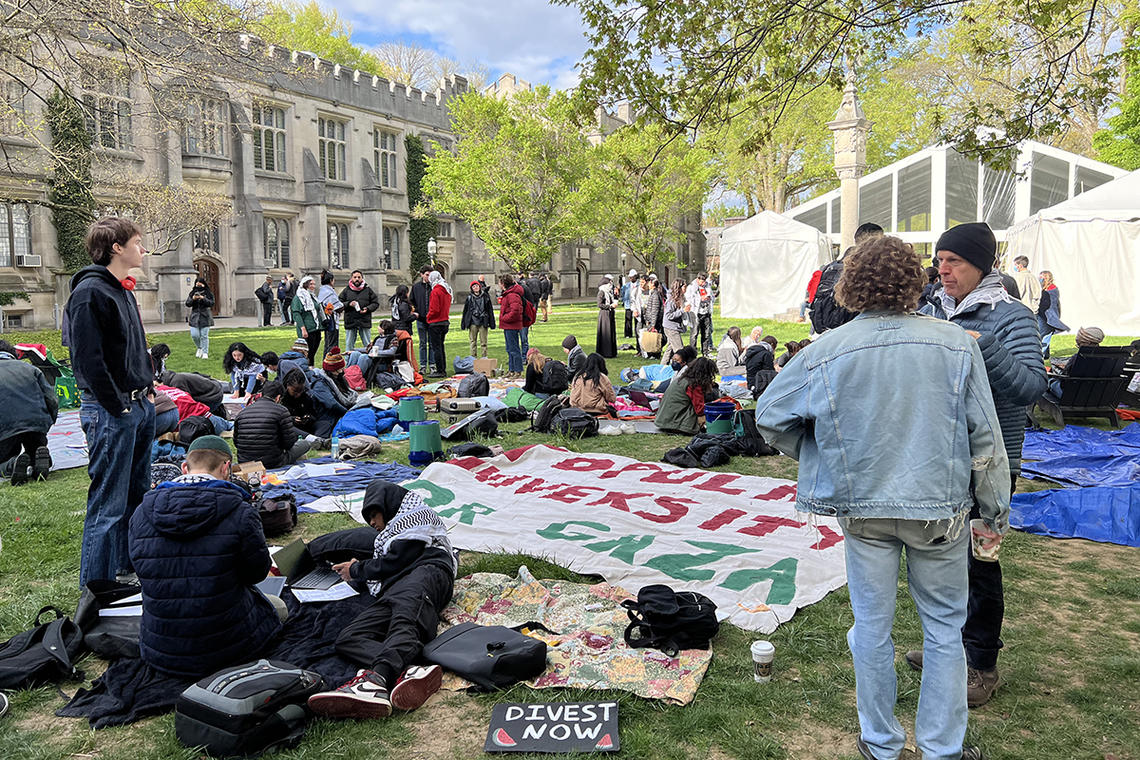
Editor’s Note: This is a breaking news story and it will be updated throughout the day.
Protesters set up tents for a student-led pro-Palestine encampment in McCosh Courtyard at about 7 a.m. Thursday. After warnings from University officials, two Princeton students were arrested, and the remaining protesters packed away their camping gear and continued the demonstration as a sit-in that went through the night — without the protesters sleeping — and was still going Friday morning.
About 110 people were there at 9 a.m. Thursday, painting banners and sitting on the ground in the grassy area between Mather Sundial and Dickinson Hall. The crowd grew to about 300 by noon. Nearby stood large, white tents set up for next month’s Reunions and Commencement events. Organizers said the crowd was a mix of Princeton students, faculty members, community members, and some people from outside the University.
Jennifer Morrill, a spokesperson for the University, confirmed in a statement that pitching tents violated University policy and two graduate students were arrested for trespassing “[a]fter repeated warnings from the Department of Public Safety to cease the activity and leave the area.” The two graduate students “have been immediately barred from campus, pending a disciplinary process,” Morrill said, and the remaining tents were “voluntarily taken down by protestors.”
A document shared by protesters identified the arrested students as Achinthya Sivalingam and Hassan Sayed. Urvi, a first-year Ph.D. student who asked to be identified only by her first name, called the arrest “violent” and said zip ties were put around their wrists. “They’ve been evicted from their houses and were given under five minutes to get their stuff,” Urvi said.
Morrill said in an email that “no force was used by Public Safety officers when conducting the arrests, which occurred without resistance.” And the University later clarified that the students were ultimately permitted to remain in their non-dormitory housing; the few minutes they were given was just to collect what they needed to have until a decision was made.
Ariel, a Jewish first-year graduate student who also gave only his first name, said the group is using the “popular university model,” meaning “we are having this educational space for students to come learn about anti-Palestinian oppression and related oppressions. We have a liberation library going, we have art builds, we have food. And as much as it is about demanding that the University divest along with our other demands, it also is about building community toward liberation.”
Later Thursday morning, Max Weiss, associate professor of history, gave a lecture-style speech to coincide with his class, History of Palestine/Israel, that was scheduled to meet at the same time.
Weiss said he and members of the class were walking out in solidarity with faculty of the University of Texas Austin, who have stopped classes for the day to support student-led protests. The crowd grew as Weiss thanked the organizers for standing up in support of Gaza. Throughout his speech, local TV helicopters circled overhead.
“Long live the solidarity, brilliance, and fearlessness of these brave Princeton students who put their bodies, privilege, and safety on the line when Palestinians are being subjected to unimaginable violence,” Weiss said.
Former New York Times Middle East bureau chief Chris Hedges also addressed the crowd but was asked to leave by Public Safety officers because he was speaking through a bullhorn. Protesters chanted “let him speak” and surrounded Hedges in an attempt to block officers. Organizers later said Hedges left campus so he could come back Friday, which he did, speaking in the early afternoon for about 20 minutes.
In the early evening Thursday, photos circulated on social media showing a flag for the terrorist group Hezbollah displayed at the sit-in. According to The Daily Princetonian, organizers said that when they saw the flag, they asked that it be put away.
Organizers are calling for Princeton to divest from companies that “profit from or engage in the State of Israel’s ongoing military campaign” in Gaza, end any University research “on weapons of war” funded by the U.S. Department of Defense, enact an academic and cultural boycott of Israeli institutions, support Palestinian academic and cultural institutions, and publicly advocate for an immediate ceasefire in Gaza.
The protest continues a series of walkouts and rallies by campus groups including the Princeton Students for Justice in Palestine (SJP), the Princeton Palestine Liberation Coalition, and Princeton Israeli Apartheid Divest (PIAD). It also follows contentious encampments at other universities, most notably Columbia, where the New York Police Department arrested more than 100 students on April 18.
Rabbi Gil Steinlauf ’91, executive director of the Center for Jewish Life, claimed in an email Friday afternoon that the protest at Princeton is being run by a small group of "graduate students, professors, and outside actors.
"We continue to have much work to do here at Princeton and on all college campuses to fight the rising scourge of global antisemitism," he said. "I am gratified that I can share with you that our diverse and vibrant community of students at the CJL are 'on it' — expressing their wide range of visions for what we must do as a Jewish people to overcome these challenges and to thrive."
Also, on Thursday, Rabbi Eitan Webb of Princeton’s Chabad House told PAW he’s heard from both Jewish and non-Jewish students who have “a deep sense of unease about what is happening on this campus,” though he also commended University administrators for “attempting to consistently enforce” policies on protesting and freedom of expression.
Webb said he believes Princeton’s role in this situation should be to “create and maintain a culture of academic inquiry, a culture which promotes the discussion of ideas, and to put the kibosh on malign actors who try to prevent that.”
Some curious passersby watched on Thursday from the sidewalk surrounding the courtyard, as well as six people who held Israeli flags and signs with photos of Israelis who were kidnapped by Hamas in October. One of them, Lori Feldstein, a Princeton local, is not affiliated with the University, but said she took time away from work to attend. Feldstein said protesters chanting “from the river to the sea” were advocating for “the elimination of the Jewish state, and that is really viscerally upsetting for all of us.”
When reports of a potential protest encampment at Princeton were published by the National Review April 24, Vice President for Campus Life W. Rochelle Calhoun sent an email to students that shared the University’s guidelines for free expression and said protests that involve “occupying or blocking access to buildings [or] establishing outdoor encampments and sleeping in any campus outdoor space” are prohibited because they are “inherently unsafe for both those involved and for bystanders.”
“Any individual involved in an encampment, occupation, or other unlawful disruptive conduct who refuses to stop after a warning will be arrested and immediately barred from campus,” Calhoun wrote. “For students, such exclusion from campus would jeopardize their ability to complete the semester. In addition, members of our community would face a disciplinary process (for students this could lead to suspension, delay of a diploma, or expulsion).”
Urvi said the University email was an attempt to suppress student activism. “We remain committed to the fact that we haven’t done anything wrong. We’re speaking out in solidarity with Palestine. And we’re exercising our right to protest peacefully, and the University threatening us with arrest, suspension, expulsion, is part of a widespread pattern of repression of pro-Palestine student speech across the country.”
Nancy Coffin, senior lecturer in Princeton’s Near Eastern studies department and director of the Arabic Language Program, also told PAW that she viewed Calhoun’s message as threatening and questioned why an encampment on campus would be “inherently unsafe,” as the vice president wrote. “It really boggles my mind how it would be unsafe in this community,” Coffin said, “and if that is the case, how do we possibly send our students on Outdoor Action?”
President Christopher Eisgruber ’83, in an op-ed published by The Daily Princetonian Thursday, explained the University’s “time, place, and manner” restrictions and argued that they “are fully consistent with — indeed, they are necessary to — Princeton’s commitment to free speech. The purpose of our policy is ‘to promote a lively and fearless freedom of debate and deliberation’ not simply to maximize expression in all its forms, no matter how disruptive.”
Princeton students have led long-term demonstrations at various points in the University’s history. In 2019, Princeton IX Now, a group advocating for victims of sexual assault, rallied for nine days outside Nassau Hall. In 2015, the Black Justice League held a 33-hour sit-in at Eisgruber’s Nassau Hall office. Other sit-ins or blockades of Nassau Hall took place in the 1970s, ’80s, and ’90s, for causes that included divestment from South Africa, the needs of minority students at Princeton, and adding courses in Latino and Asian American studies.

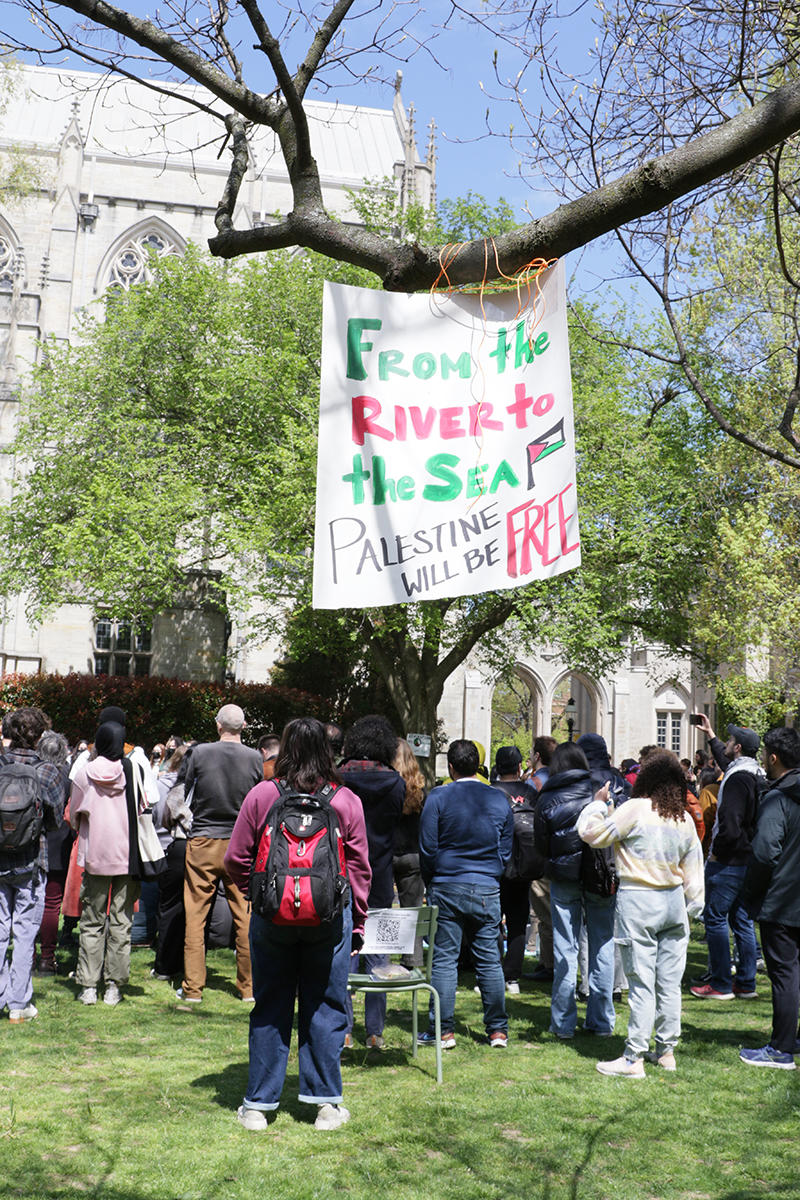
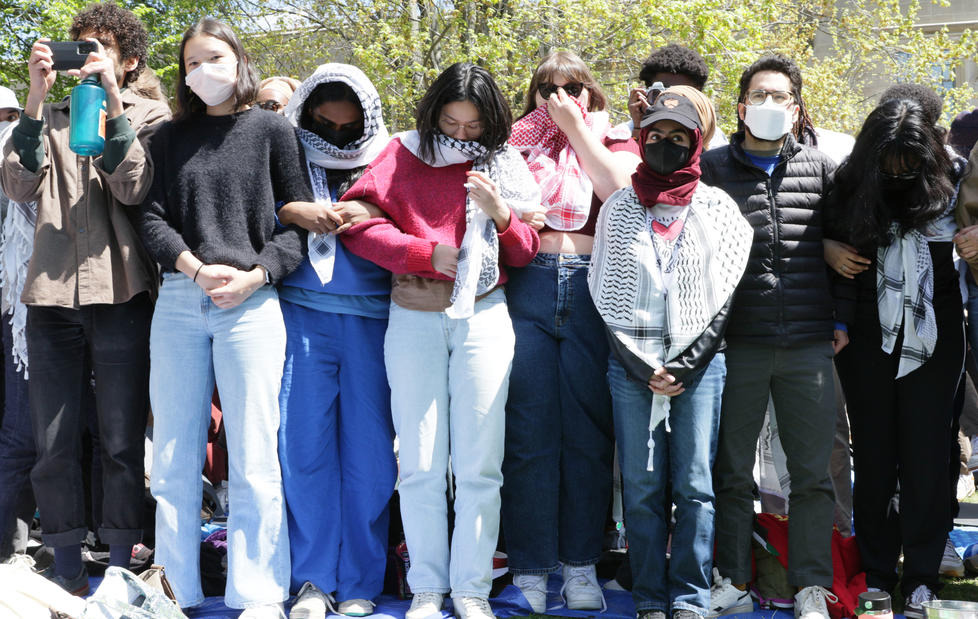
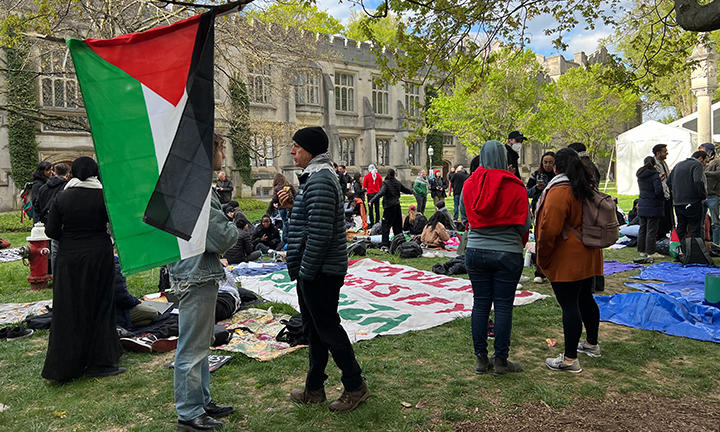
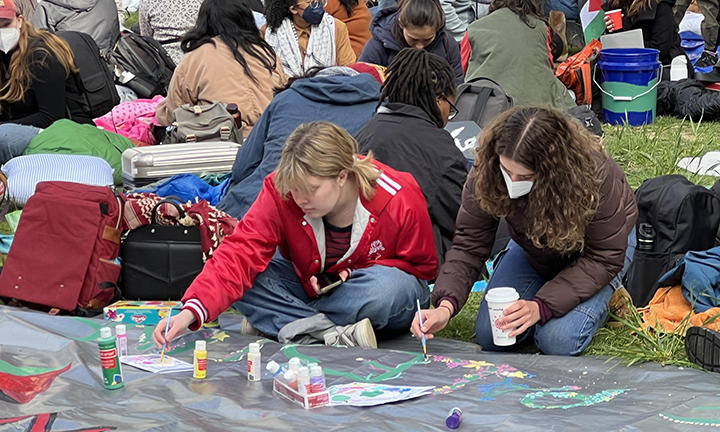
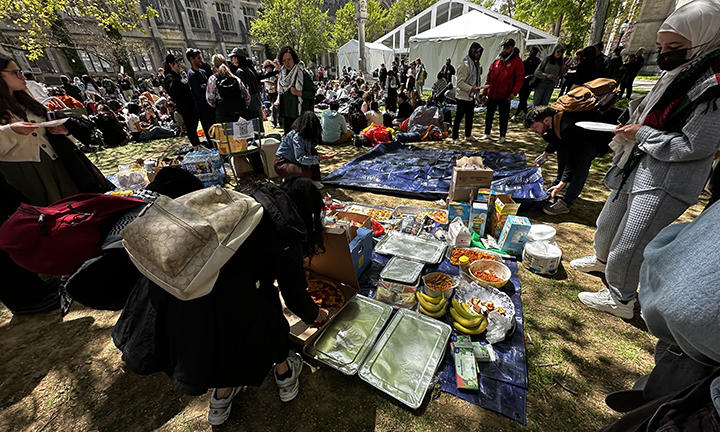
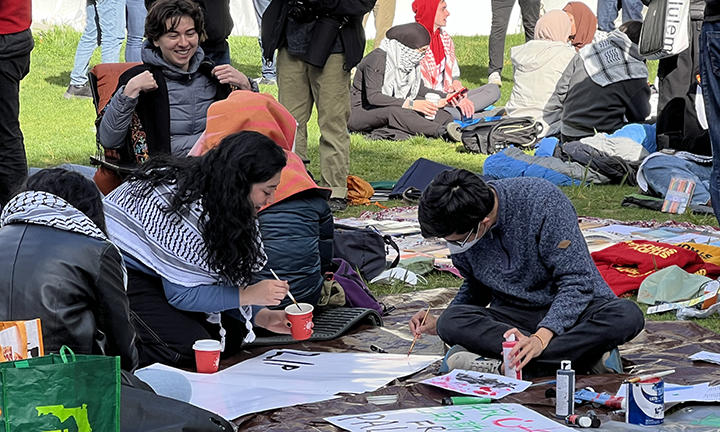






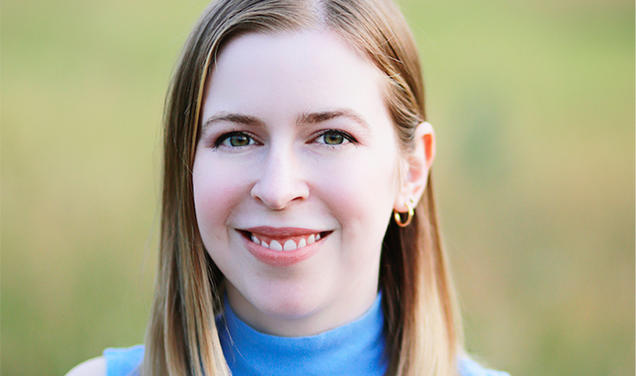


9 Responses
Glenn Castro ’71
8 Months AgoHistorical Precedent
Why was the most prominent student protest, the anti-Vietnam War protests, omitted in the article’s listing of student protests? Too similar to the current politics?
William J. Chambers ’67
8 Months AgoProtesters’ Tactics and ‘The Idea of a University’
In attempting to understand the student protests at Princeton resulting in the arrest of two graduate students for constructing tents and refusing to remove them from an encampment in McCosh Courtyard (published online April 25, 2024), I was prompted to seek the wisdom of John Cardinal Newman, memorialized in his lectures on being appointed the first rector of University College, Dublin, published in 1873 as The Idea of a University.
I suggest that all University leaders and faculty consider Cardinal Newman’s wisdom, which I present in edited form: “though they [the students] cannot pursue every subject which is open to them, they will be the gainers by living among those and under those who represent the whole circle. This I conceive to be the advantage of a seat of universal learning, considered as a place of education. An assemblage of learned men, zealous for their own sciences, and rivals of each other, are brought, by familiar intercourse and for the sake of intellectual peace, to adjust together the claims and relations of their respective subjects of investigation. They learn to respect, to consult, to aid each other. Thus is created a pure and clear atmosphere of thought, which the student also breathes, though in his own case he only pursues a few of the sciences out of the multitude. He profits by an intellectual tradition, which is independent of particular teachers, which guides him in his choice of subjects, and duly interprets for him those which he chooses. … A habit of mind is formed which lasts through life, of which the attributes are freedom, equitableness, calmness, moderation , and wisdom… . This then I would assign as the special fruit of the education furnished at a University, as contrasted with other places of teaching or modes of teaching. This is the main purpose of a University in its treatment of its students.”
To paraphrase and elaborate on Cardinal Newman, the University is a place, sequestered from the pragmatic demands and pressures of the outside world, where students engage with each other, under the guidance of their teachers, in reasoned discourse, devoid of coercion, threats, intimidation, manipulation, and all of the tactics employed by the current “protesters” in support of one side or the other in the current Middle East conflict.
If these tactics are anathema to the “idea of a university,” then those who practice these tactics within the University are akin to a person who brings a baseball bat to a tennis match. They are not arrested, unless they commit a crime, criticized, or even expelled. They just don’t belong. And, since the idea of the University is to teach, students are reminded of “the idea of a university,” and should be instructed to disperse.
So as to not appear self-righteous, I must confess that the writer and two accomplices were “punished” by Dean William Lippincott by being suspended from the university for the entire Thanksgiving holiday for painting “Men” and “Women” on the pediments of Whig and Cliosophic Halls. We were appropriately given a warning to thereafter follow University rule, and we understood that this was the first and last such disciplinary action we would face, and all three graduated successfully and without further incident.
Similarly, those who refuse to disperse, after being made aware of their future if they refuse to disperse, should receive the simple statement: “We accept your withdrawal from the University.” You don’t bring a baseball bat to a tennis match just as you don’t act outside of the prescribed standards of the University to address thorny issues by resorting to coercion, threats, manipulation, or provocation to advance your agenda. You just don’t belong, and you quietly leave.
This is not to say that this should be the end of the discussion or absolve the University of responsibility. I can say, as a psychiatrist of more than four decades, that passions such as those expressed by the protestors cannot be merely wished away or decided in one direction or another by a nonexistent authority. The concerns of people on either side are real and, by some estimations, irreconcilable. They are both also true. Which is exactly what Cardinal Newman envisioned as the purpose of a university: to promote dialogue between people of irreconcilable beliefs.
The world has seen this in the microsphere of Seeds of Peace, where teenagers from Israel and Palestine spend a month living together in an isolated camp in Maine, starting out as bitter enemies and end as the strongest of friends. I suggest that, when the University foresees, or sees a convulsive episode beginning, that they charge the Whig Cliosophic Society to fulfill its historic role: to convene a series of ongoing conferences open to the entire University, where those of opposing viewpoints can engage in reasoned discussion of the subject, with no expectation of any outcome save mutual understanding. Then, I suggest that the University will have fulfilled its role in our society.
Janice Stultz Roddenbery *77
8 Months AgoReasons for Concern
This situation distresses me for three reasons. My own undergraduate commencement from Tufts in June 1970 was cancelled because students went on strike to protest the invasion of Cambodia. I am planning to see a dear friend graduate from Columbia on May 15, and have become afraid to attend out of fear of being caught in a violent riot. Those two concerns make me sad for young people and their families who have looked forward to graduation ceremonies. The third reason for my concern is that as someone who weathered the arduous task of earning a Ph.D. from Princeton, I cannot understand why graduate students have become involved in these protests to the degree of getting arrested, rather than hunkering down, preparing for their generals, and researching and writing their dissertations. Young people are idealistic, and I admire their desire to make the world a better place. But I also think that this type of behavior does not help meet that objective. It just causes detriment to their primary reason for being in Princeton Graduate School: To complete their studies, earn their degrees, and put what they’ve learned at Princeton to good use.
Harold J. Bursztajn ’72
8 Months AgoProud of Princeton
Proud of Princeton’s thoughtful leadership in preventing a foreseeable attractive nuisance for those who seek to flout the rules and intimidate, masked as social-justice warriors, while declaring themselves as immune from the rules of authorized space protest.
Glenn Castro ’71
8 Months AgoCondemning Genocide
It is a low point in Princeton University’s history when the leader is unable to condemn an obvious genocide.
Stuart Taylor Jr. ’70, president; Edward Yingling ’70, secretary; Todd Rulon-Miller ’73, treasurer; Leslie Spencer ’79, vice chair
8 Months AgoPrincetonians for Free Speech Letter to Vice President Calhoun
Princetonians for Free Speech sent the following letter to Vice President for Campus Life Rochelle Calhoun on April 25 in support of her April 24 email to all students stating that violations of Princeton’s protest rules would result in arrest, removal from campus, and possible suspension or expulsion. To avoid disruption to university operations, PFS urges Calhoun to follow through on enforcing these rules.
Dear Vice President Calhoun:
We, the officers of Princetonians for Free Speech (PFS), are writing to you on behalf of PFS in support of your email of April 24, in which you reminded Princeton students of the University’s rules regarding free speech and protests on campus. Earlier today President Eisgruber put out a statement consistent with your email, and we support his statement as well.
PFS is a Princeton alumni group created to promote free speech and academic freedom at Princeton. We therefore strongly support the rights of members of the Princeton community to express their views, no matter what those views may be, and to do so in a robust manner. While the First Amendment does not directly legally apply to private universities such as Princeton, we believe its principles should be followed by Princeton and that those principles are best applied by the adoption of the Chicago Principles, which Princeton has done.
However, both the First Amendment, as interpreted by the Supreme Court, and the Chicago Principles include the ability to have appropriate and narrowly drawn time, place, and manner regulation for speech. Princeton's rules, as you point out in your email, include such regulation.
During the recent protests at Columbia, NYU, and other universities, some protestors have argued that their disruptive protests are protected free speech. They are clearly confusing free speech with civil disobedience. The actions of at least some of these protestors violate legitimate university rules designed to protect students against harassment and to enable universities to carry out their educational missions. Here is a link to the excellent article, Protest and Civil Disobedience are Two Different Things by Princeton Professor Keith Whittington, published on April 23 in the Chronicle of Higher Education.
Apparently some planning a protest at Princeton are claiming your email is a prior restraint on speech. Under this false reasoning, any rule on free speech would be a prior restraint. We believe it was entirely appropriate for you to advise students of Princeton's existing rules and to state that they will be enforced.
We urge Princeton to enforce its rules as you have laid out in your email. Equivocating on enforcement only leads to greater problems, as the situation at Columbia clearly shows.
Jonathan Fredman ’80
8 Months AgoDisplay of Hizballah Flag
I see that the demonstrators displayed the flag of Hizballah.
Your readers may wish to know the following: “Formed in 1982 in response to the Israeli invasion of Lebanon, Hizballah (the ‘Party of God’), a Lebanon-based Shia terrorist group, advocates Shia empowerment globally. Hizballah has been involved in numerous anti-U.S. terrorist attacks, including the suicide truck bombings of the US Embassy in Beirut in April 1983, the U.S. Marine barracks in Beirut in October 1983, and the U.S. Embassy annex in Beirut in September 1984, as well as the hijacking of TWA 847 in 1985 and the Khobar Towers attack in Saudi Arabia in 1996.” Source: Office of the Director of National Intelligence, Counterterrorism Guide.
Richard M. Waugaman ’70
8 Months AgoCriticizing Israel Is Not Necessarily Antisemitic
As a philosemitic Christian, it saddens me when many Jews still equate any criticism of Israel, or any solidarity with the Palestinians, as inherently antisemitic. It is not. Just look at the number of American Jews who now speak out against Israel’s brutal attacks on Gaza, leading to more than 34,000 deaths, according to the United Nations Office for the Coordination of Humanitarian Affairs. Published studies have estimated well over half are noncombatants, including children. And the shameful efforts of Israel to block humanitarian aid from reaching those who are starving in Gaza. Most shocking of all for a group who were targeted in the Holocaust, some Israeli right-wing extremists have called for the elimination of all Palestinians.
The Jewish ideal of tikkun olam calls for the ethical treatment of all people, Jewish or gentile.
Norman Ravitch *62
8 Months AgoPrinceton Looks Better Than Most Universities
Compared to Columbia and USC, Princeton students seem to have some sense of balance in their demonstrations. And the administration as well. I hope the contingent of leftists professors doesn’t come along to make things worse. I am also amazed at how the Princetonians of today dress. Back in my day it was a lot more conventional but pleasing.